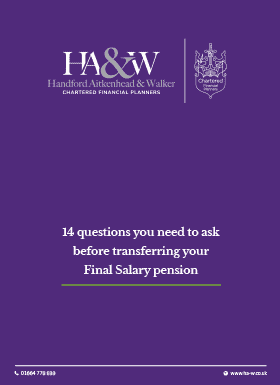14 questions you need to ask before transferring your Final Salary pension
In years gone by, Final Salary pensions were the norm for many employees. At the end of their working life a guaranteed, often index-linked pension was payable until they died. Furthermore, if their spouse outlived them a proportion of the pension income continued to be paid. For most people, the thought of giving up an often generous, guaranteed pension, never occurred to them.
However, a combination of the introduction of Pension Freedoms in 2015 and the relatively high transfer
values offered by some schemes, has increased the number of people transferring their Final Salary
pension into an alternative arrangement.
If you have a Final Salary pension you may be considering the options available to you. We have therefore written this guide to help you understand the key questions you need to answer before making any decisions.
Before we go any further, we should point out that Final Salary pensions are also often referred to as Defined Benefit schemes. However, to keep things simple, we’ll refer to them as Final Salary pensions throughout the rest of this guide.
Why might people transfer their Final Salary pension?
In our experience, the reasons that people consider transfers are:
- They see the chance to “own” a larger sum of money in a pension in their name.
- They see a potential improvement in the size of legacy they may leave to their loved ones.
- They are interested in the ability to draw funds flexibly, as lump sums or income.
However, anyone who does transfer their Final Salary pension will give up a guaranteed and often
inflation-proofed annual income and may well be worse off by doing so.
Furthermore, it’s not a decision which can be reversed. Once the transfer has been completed the member cannot change their mind. For these reasons, careful consideration must be given to all options before a final decision is made.
The right course of action will be different for everyone, which is why taking independent financial advice is so important. We can’t hope to tell you in this guide what’s right for you. However, we suggest that no one should transfer out of their Final Salary scheme without first taking advice and answering these 14 questions.




